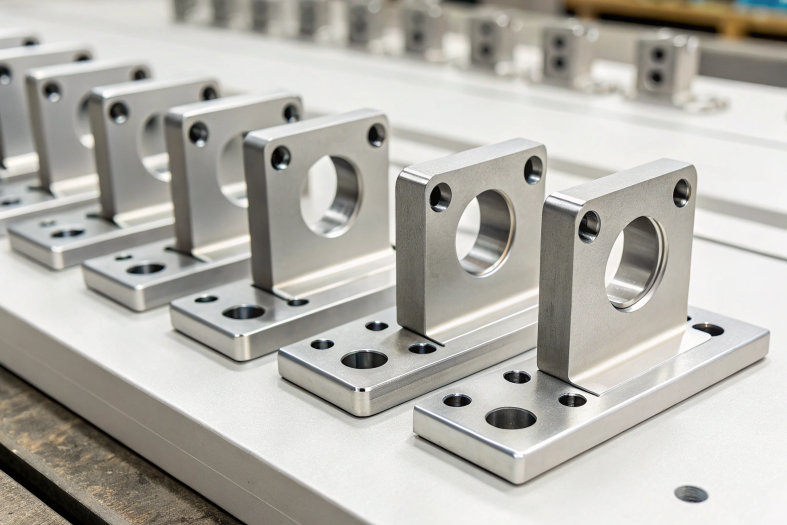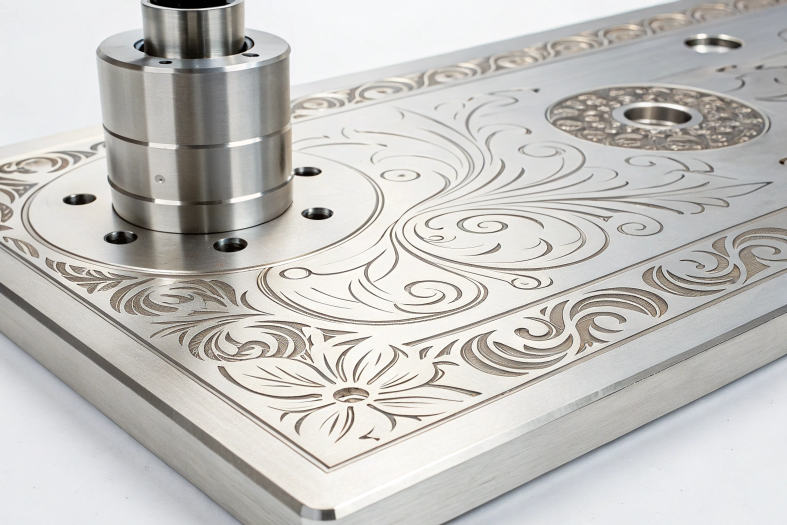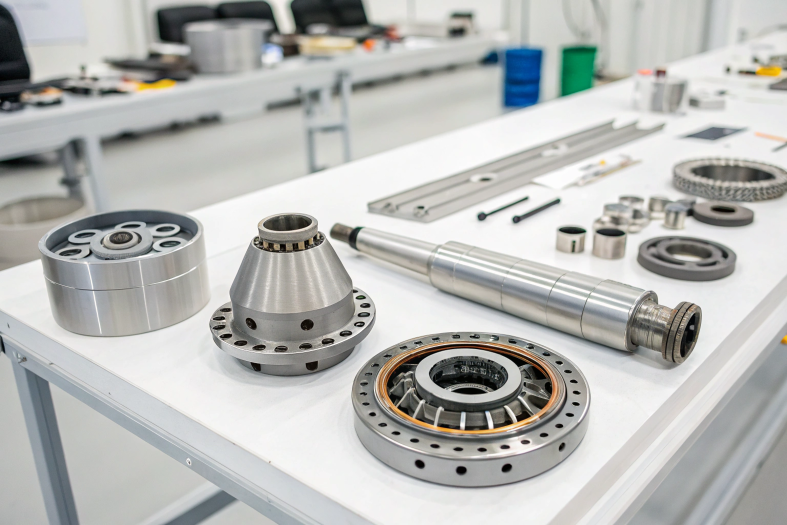In today’s highly competitive global manufacturing landscape, companies face immense pressure to increase efficiency, reduce costs, and meet the diverse demands of the market. Traditional manufacturing methods often struggle to provide the flexibility and precision required for advanced production. CNC machining has emerged as a game-changer in this scenario, offering a solution through its high level of automation and precision. With CNC (Computer Numerical Control) machines, businesses can enhance production efficiency and achieve unprecedented accuracy, meeting the demands for high-quality products, shorter lead times, and lower costs.
Direct Answer:
CNC machining drives global manufacturing trends by improving production precision, reducing cycle times, and cutting labor costs. It enables large-scale customization and personalized production, making it a crucial technology for companies striving to lead in the era of digital transformation and smart manufacturing.

1. The Rise of Automation in CNC Machining
Why Automation is Key to Modern Manufacturing
CNC machining has introduced automation to manufacturing processes, reducing the need for human intervention. By operating with minimal manual input, CNC machines enhance productivity, consistency, and cost-efficiency. This automation makes round-the-clock production possible, which is a huge advantage for businesses striving to meet increasing demand.
Reducing Costs and Errors with CNC Automation
By automating repetitive tasks, CNC machines eliminate the costs associated with manual labor and minimize the potential for human error. For industries like aerospace, automotive, and medical devices—where precision is paramount—automation ensures the highest standards of quality without compromising on time or cost.
Real-World Example:
Toyota’s use of CNC machines in automotive production has helped reduce human labor requirements while increasing accuracy in part manufacturing. This automation supports Toyota’s focus on efficiency and precision.
2. Precision and Quality Control in Global Manufacturing
Achieving Unmatched Precision
CNC machining is renowned for its ability to produce parts with exceptional precision and tight tolerances. This makes it indispensable for industries that require flawless parts, such as aerospace, medical devices, and electronics.
Ensuring Consistency in Quality
CNC machines maintain high levels of repeatability, ensuring that each part is produced to the same exact specifications. This consistency reduces defects, improves product quality, and lowers costs due to fewer rejections and remakes.
Real-World Example:
Boeing relies on CNC machining for producing critical aircraft components. The precision of CNC machines ensures that each part meets stringent safety and quality standards.
3. Faster Production Times and Lead Times
CNC Machining's Speed Advantage
CNC machines automate cutting, drilling, and other processes, significantly speeding up production times compared to traditional methods. With the ability to produce complex parts more quickly, CNC machining helps businesses meet tighter deadlines and increase overall throughput.
How CNC Reduces Lead Times
In contrast to manual methods where each part must be adjusted and machined individually, CNC systems use pre-programmed instructions for quick, efficient operation. This leads to faster turnarounds and shorter lead times, allowing businesses to respond faster to market demands.
Real-World Example:
Stryker, a leading medical device manufacturer, uses CNC machining to rapidly produce complex medical devices. This speed allows Stryker to fulfill urgent orders and meet critical medical needs.

4. Customization and Flexibility in Manufacturing
The Power of Custom Parts
CNC machining offers unparalleled flexibility in producing custom parts and prototypes. Whether it’s for a one-off order or a small production run, CNC machining eliminates the need for costly tooling or molds, making it ideal for businesses that need unique or customized components.
Meeting Client-Specific Needs
With CNC, businesses can produce parts tailored to the exact specifications of their clients. This is especially useful in industries like medical devices, aerospace, and electronics, where bespoke components are often required.
Real-World Example:
Apple utilizes CNC machines to manufacture custom aluminum casings for its products, ensuring both precision and quality in each part.
5. Sustainability and Environmental Benefits
Reducing Material Waste
One of the key environmental benefits of CNC machining is its ability to reduce material waste. Unlike traditional methods that may result in a large amount of scrap, CNC machines remove only the material needed, reducing waste and lowering production costs.
Energy-Efficient CNC Machines
Modern CNC machines are more energy-efficient, using less power while maintaining high levels of output. This contributes to more sustainable manufacturing practices and helps businesses meet their environmental goals.
Real-World Example:
Many companies are now investing in energy-efficient CNC machines and adopting practices that minimize waste, aligning with the growing demand for sustainable manufacturing solutions.
6. CNC Machining’s Role in the Digitalization of Manufacturing
Integrating CNC with Industry 4.0
CNC machining is integral to Industry 4.0, which combines traditional manufacturing with digital technologies. By integrating CNC machines with IoT (Internet of Things) and AI (Artificial Intelligence), manufacturers can track real-time data, optimize machine performance, and predict maintenance needs.
Revolutionizing Manufacturing Operations
The digitalization of CNC machines allows businesses to improve operational efficiency, reduce downtime, and ensure optimal production quality. Smart sensors and AI integration help streamline workflows and make manufacturing processes more adaptive.
Real-World Example:
Siemens uses digital technologies to monitor and optimize CNC machines, reducing downtime and improving production outcomes.
7. CNC Machining’s Impact on Global Supply Chains
Redefining Global Supply Chain Dynamics
CNC machining is changing the global supply chain by enabling on-demand production. This reduces the reliance on long lead times and mass production methods, giving businesses more flexibility and faster response times.
The Shift Towards Localized Manufacturing
With CNC machining, companies can shift away from low-cost mass production overseas and move towards localized manufacturing. This shift reduces transportation costs, shortens lead times, and mitigates risks associated with global supply chains.
Real-World Example:
Dell and HP are using CNC machining to localize their production in North America and Europe. This allows them to meet customer demands faster and reduce the impact of supply chain disruptions.

Conclusion
CNC machining is at the heart of several global manufacturing trends, including automation, precision, customization, and sustainability. Its ability to improve efficiency and flexibility gives businesses the tools to stay competitive in a rapidly changing market.
As more manufacturers embrace CNC machining, they can improve their operations, reduce costs, and create products that meet the specific needs of their customers. Whether you are looking to reduce lead times, produce custom parts, or adopt smart manufacturing technologies, CNC machining is shaping the future of global manufacturing.
FAQ
1. What is the importance of CNC machining in the manufacturing industry?
CNC machining is crucial to modern manufacturing because it allows for precise, automated, and efficient production of complex parts. It ensures high accuracy, reduces human error, minimizes material waste, and can handle both high-volume and custom orders. CNC machining supports various industries such as aerospace, automotive, medical devices, and electronics by meeting stringent quality standards and enabling rapid prototyping.
2. How have CNC machines impacted modern manufacturing?
CNC machines have revolutionized manufacturing by:
- Improving precision: Offering tight tolerances and high-quality production.
- Reducing labor costs: Automating processes that previously required extensive manual labor.
- Increasing efficiency: Speeding up production cycles and reducing lead times.
- Enabling customization: Allowing for bespoke parts and prototypes without the need for expensive molds or tooling.
- Enhancing flexibility: CNC machines can easily be reprogrammed to produce different parts, making them ideal for diverse production runs.
3. What are the future trends in CNC machining?
Future trends in CNC machining include:
- Integration with AI and IoT: Using artificial intelligence and the Internet of Things (IoT) to monitor and optimize machine performance in real-time.
- Advanced materials: CNC machining will increasingly handle new, tougher materials like composites and high-temperature alloys.
- Automation and robotics: Further automation, including the use of robots alongside CNC machines to handle loading/unloading and inspection.
- Sustainability: Increased focus on energy-efficient machines and reducing material waste to meet environmental standards.
- Smart manufacturing: The rise of Industry 4.0, where CNC machines are integrated into connected digital ecosystems for more efficient and adaptive production.
4. What is the impact of CNC machining?
The impact of CNC machining is profound, as it:
- Improves precision and consistency across production lines, leading to better quality control.
- Reduces production costs by decreasing labor and material waste.
- Increases speed and efficiency, allowing companies to meet market demands quicker and more efficiently.
- Supports customization, giving businesses the flexibility to produce specialized parts for various industries.
- Fosters innovation in design and production processes, enabling more complex and intricate designs that traditional machining couldn’t achieve.


